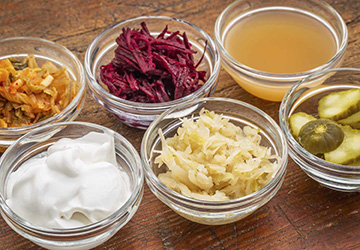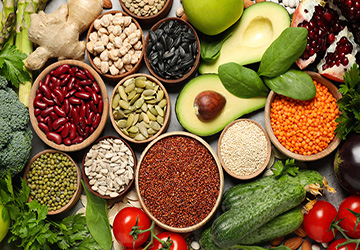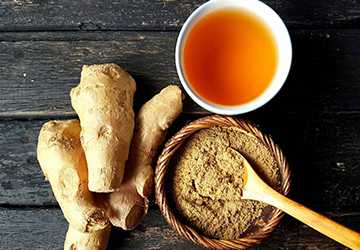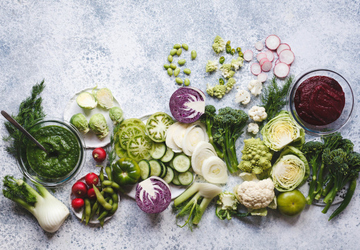What to Eat for Optimal Gut Health: A Guide to Dietary Choices for Digestion
Gut health is central to our overall well-being. From aiding in absorbing essential nutrients to playing a pivotal role in our immune system, the gut is undeniably a critical aspect of our health. One of the primary ways to ensure optimal gut health is through dietary choices. This article dives deep into the world of gut health foods and optimal gut nutrition, providing the tools you need to make the best nutritional choices for digestion.
1.Understanding the Gut: A Quick Overview
Before we delve into the best foods for gut health, it's essential to understand the complexity of the gut. Comprised of trillions of bacteria, the gut microbiota plays a vital role in digestion, immune function, and mental health. The balance of these bacteria is crucial; this is where diet plays a significant role.

2.Fermented Foods: Probiotics in Action
One of the staples of optimal gut nutrition is fermented foods. These foods are rich in probiotics, which are live bacteria beneficial to our gut. Examples include:
● Yogurt
● Kefir
● Sauerkraut
● Kimchi
● Miso
Regularly incorporating these foods into your diet can ensure a steady influx of beneficial bacteria, supporting a balanced gut microbiota.
3.Fiber: The Unsung Hero for Gut Health
Fiber is a non-digestible carbohydrate that acts as food for our gut bacteria. Consuming a fiber-rich diet can enhance the health and diversity of our gut microbiota. Some high-fiber gut health foods include:
● Whole grains (like quinoa, oats, and barley)
● Legumes (like lentils and chickpeas)
● Vegetables (like broccoli, carrots, and Brussels sprouts)
● Fruits (like apples, pears, and berries)
4.Omega-3 Fatty Acids: Anti-inflammatory Powerhouses
Inflammation can be detrimental to gut health. Omega-3 fatty acids, found in foods like fatty fish (salmon, mackerel, sardines) and flaxseeds, have powerful anti-inflammatory properties. Incorporating these into your diet can protect the gut lining and promote overall gut health.
5.Polyphenol-Rich Foods: Boosting Gut Diversity
Polyphenols are plant compounds that can boost the diversity of the gut microbiota. Foods rich in polyphenols include:
● Dark chocolate
● Red wine (in moderation)
● Green tea
● Blueberries
● Almonds
Including these foods in your diet not only enhances gut health but also offers a plethora of other health benefits.
6.Hydration: A Simple Yet Crucial Aspect of Optimal Gut Nutrition
Water plays a pivotal role in dietary choices for digestion. It aids in producing mucus in the gut and ensures smooth digestion. Aim to drink at least eight glasses of water daily to support digestive health.
7.Foods to Avoid: Potential Disruptors of Gut Health
While numerous foods support gut health, some might disrupt it. Foods high in sugars, artificial sweeteners, and unhealthy fats can negatively impact gut microbiota. Additionally, excessive consumption of processed foods and alcohol should be minimized for optimal gut health.
8.The Role of Prebiotics: Feeding the Beneficial Bacteria
Prebiotics are non-digestible food components that promote the growth of beneficial bacteria in the gut. Foods rich in prebiotics include garlic, onions, bananas, and asparagus. By consuming these, you provide your gut bacteria with the nourishment they need to thrive.
9.Importance of Herbal Teas for Gut Health
Many herbal teas play a role in improving digestion and overall gut health:
● Peppermint Tea: Known for its muscle-relaxing properties, it can ease digestive discomfort.
● Ginger Tea: Offers anti-inflammatory properties and can soothe nausea.
● Chamomile Tea: Helps to reduce stress, which can contribute to gut issues.

10.Respecting Meal Times and Mindful Eating
For optimal gut nutrition, it's not just what you eat but how and when:
● Regular Meal Times: Eating at consistent times helps regulate the digestive system.
● Mindful Eating: Paying attention to what you eat and savoring every bite can prevent overeating and improve digestion.
11.Importance of Avoiding Antibiotics Overuse
Antibiotics can disrupt the balance of gut microbiota:
● Consultation: Always consult with a healthcare professional before taking antibiotics.
● Probiotic supplementation: If on antibiotics, consider a probiotic supplement to restore balance.
12.Understanding the Gut-Brain Connection
Our gut is often referred to as the "second brain," highlighting the profound connection:
● Mood and Gut Health: Stress and depression can impact gut health and vice versa. A balanced diet is crucial not just for digestion but for mental well-being, too.
● Serotonin Production: Most of the body's serotonin, a mood regulator, is produced in the gut. Proper nutrition ensures its optimal production.
13.Diverse Diet for Diverse Microbiota
Diversity is vital for a balanced gut:
● Rotate Foods: Incorporate different gut health foods regularly.
● Introduce New Foods: Now and then, add a new vegetable, fruit, or grain to your diet. This introduces new types of fibers and nutrients, promoting diverse gut bacteria.
14.Limiting Artificial Sweeteners
Recent studies suggest that artificial sweeteners can adversely affect gut bacteria:
● Read Labels: Ensure products don't contain excessive artificial sweeteners.
● Natural Alternatives: Opt for stevia or honey in moderation.
15.The Role of Exercise in Gut Health
Physical activity can improve digestion and the health of your microbiota:
● Regular Movement: Even a daily 30-minute walk can promote better digestion.
● Yoga for Gut Health: Poses like the child's or wind-relieving pose can directly aid digestion.
16.Embracing Traditional Culinary Wisdom for Gut Health
Throughout history, various cultures have leaned on their unique culinary traditions to support digestion and gut wellness:
● Bone Broth: Often consumed in Asian and European cultures, bone broth provides essential nutrients that can heal the gut lining.
● Tumeric & Ginger: Commonly used in South Asian cuisines, these spices are renowned for their anti-inflammatory properties and digestion benefits.
● Aloe Vera: In various traditional diets, aloe vera juice has been consumed for its soothing properties on the digestive tract.
By exploring and incorporating these age-old culinary gems into our modern diets, we can tap into the collective wisdom of our ancestors and promote optimal gut health.
Conclusion
Gut health foods and the broader topic of optimal gut nutrition deserve attention daily. By making informed dietary choices for digestion, not only do we support our gut but also our overall health. Remember to consume fermented and fiber-rich foods and stay hydrated regularly. At the same time, be wary of foods that can disrupt gut health and always aim for a balanced diet.





